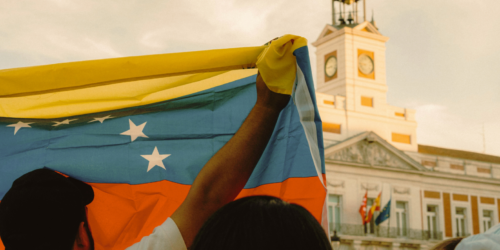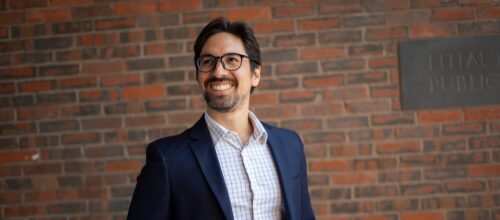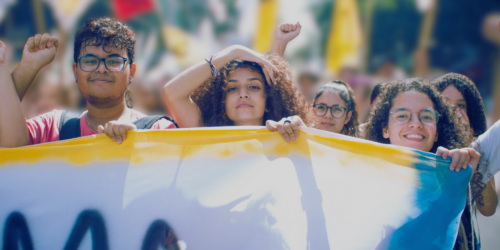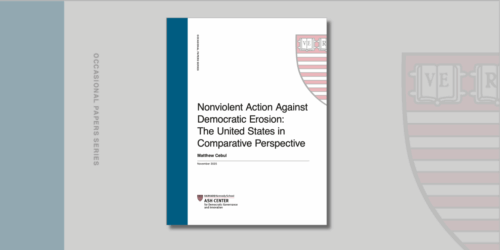
Commentary
How Maduro’s Dictatorship Plans to Survive
Even with Nicolás Maduro gone, the fight for Venezuela’s future is far from over. Freddy Guevara warns that Maduro’s successors are more interested in regime survival than democratic reform.
Feature
Imprisoned and now exiled for his opposition to the Venezuelan government, Guevara is working to stem the growing tide of authoritarianism.
In 2024, more than 50 countries, home to more than half the world’s population, will be holding national elections. Among those countries will be Venezuela.
But Freddy Guevara MC/MPA 2024 knows from painful personal experience that the elections will not be fair and free. Imprisoned, reduced to seek refuge in an embassy for years to avoid arrest, and then exiled for his work as a leader of the country’s opposition, Guevara is not surprised by President Nicolas Maduros’s backpedalling on commitments to democracy. “He is dictator, and he believes that allowing people to freely choose their leaders in Venezuela is a threat to his regime,” Guevara says.
Guevara knows far better than most the lengths to which Venezuela’s leaders have taken aim at the country’s democratic institutions. In 2007, as an undergraduate at Universidad Católica Andrés Bello in Caracas he helped lead student protests sparked by then-Venezuelan President Hugo Chavez’s attempts to shut down the country’s independent media. His experience as a student activist encouraged him to become more deeply involved in Venezuela’s democratic opposition movement, which led to a successful run for city council in Caracas—and ultimately for a seat in the Venezuelan Congress.
As the Chavez regime increased its crackdown on political opponents, Guevara was ultimately thrust into the leadership of the country’s democratic opposition. “I evolved from student leader to a councilman, then to the leader of my party—because the leader of my party was put in jail,” he recalls. “I was simply working to defend my country’s democracy.”
Maduro, Chavez’s handpicked successor, continued this campaign against the country’s democratic institutions and those who dared speak out against Venezuela’s growing authoritarianism. Guevara says “Maduro went after parliament, and I helped lead the defense of our country’s institutions. And because of that, he went after me.”
Guevara spent nearly three years in hiding in the Chilean embassy in Caracas eluding arrest from politically motivated charges. After high level negotiations secured his release from the embassy, Maduro ultimately went back on his word and rearrested him. “I got out and they put me in jail six months later. I spent 38 days there in solitary confinement.”
After international mediators secured his release once again, Guevara was effectively barred from returning to Venezuela. “When I learned that I wasn’t going to be able to go back, I started thinking about options,” he says. A former colleague who had completed the MPA at the Kennedy School had suggested he apply to HKS. “He told me that the best thing that you can do with your time is to gain knowledge and have an education.”
Arriving in Cambridge, Guevara was determined to make good use of his time in exile. “I started to reflect on my years of struggle against Chavez and Maduro—and wanted to understand the missteps we made and what we could do differently in the future,” he says.
The question of why Maduro was still in power after all the rallies, strikes, and international approbation led Guevara to Professor Erica Chenoweth, the Frank Stanton Professor of the First Amendment, and their team at the Nonviolent Action Lab at the Ash Center. Chenoweth has been asking many of the same questions about the durability of authoritarian regimes. “Erica really wanted to hear my experience and perspective as a democracy practitioner,” Guevara recalls. “They wanted to hear and reflect on the things that were happening in Venezuela and use those experiences to also help test their own research theories.”
“I’ve benefited immensely from the profound insights and experiences Freddy has brought to the Nonviolent Action Lab,” Chenoweth says. “He’s one of the leading minds working on countering global authoritarianism in the world today, and I look forward to collaborating with and learning from him for years to come.”
As a research assistant in Chenoweth’s lab, Guevara worked to help understand the reasons behind the faltering success rates of civil resistance movements around the world. “It’s not only Venezuela, it’s Myanmar, it’s Hong Kong, it’s Belarus, it’s Nicaragua, it’s Bolivia, it’s Sudan. You have a lot of countries that experienced civil resistance campaigns, but at the end, the dictatorships prevailed,” Guevara says.
Understanding how pro-democracy movements such as his own in Venezuela can succeed in the future will continue to be central to Guevara’s work after he graduates. Specifically, he’ll be looking at the intersection of democracy and critical emerging technologies such as AI as he continues his work at HKS as a research fellow with Chenoweth’s lab.
“Yes, I expected to gain knowledge of political systems and democracy when I came to HKS, he says. “But in the end, I learned far more about my life, public service, and leadership—all of which I hope will impact my work to restore freedom in Venezuela.” Ultimately, Guevara says, “my commitment is not only to Venezuela. It’s to democracy itself–and how I can help and contribute to this global struggle.”
Commentary
Even with Nicolás Maduro gone, the fight for Venezuela’s future is far from over. Freddy Guevara warns that Maduro’s successors are more interested in regime survival than democratic reform.
Policy Brief
Erica Chenoweth and Matthew Cebul analyze the global surge of Gen Z-led protest movements, showing how economic insecurity, exclusion from power, and corruption are driving youth mobilization worldwide.
Occasional Paper
In this report, Matthew Cebul, Lead Research Fellow for the Nonviolent Action Lab, examines the effectiveness of nonviolent action movements in supporting democratic resilience globally. Identifying challenges faced by nonviolent pro-democracy movements, Cebul offers key takeaways for combating accelerating democratic erosion in the US and abroad.


